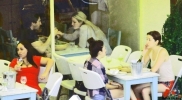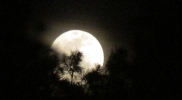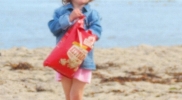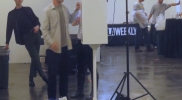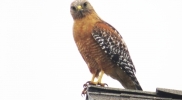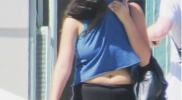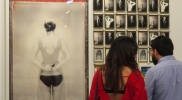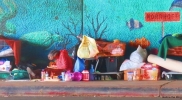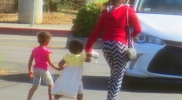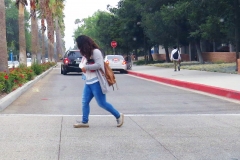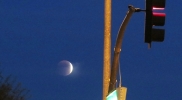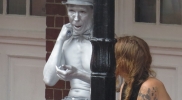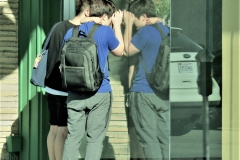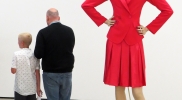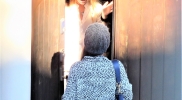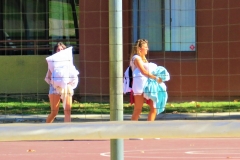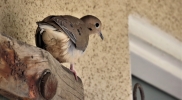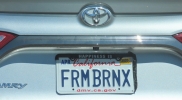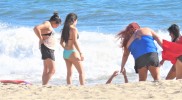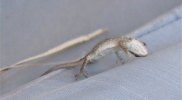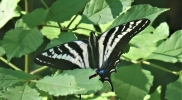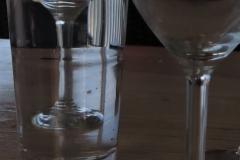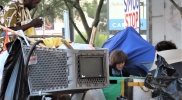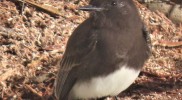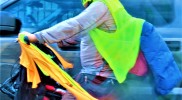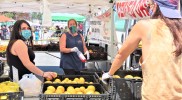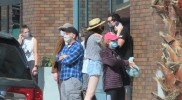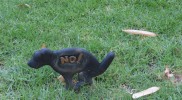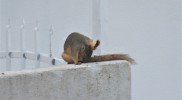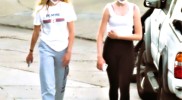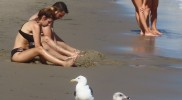|
|
Best Poems - Food
Best Poems – FOOD
|
|
|
| Disgusting – Anonymous
“In the boarding house where I live
Things are getting very old.
Long gray hairs in the butter,
And the cheese is green with mold,
When the dog died we had sausage
When the cat died catnip tea.
When the landlord died I left it;
Spareribs are too much for me.” |
| Peas – Anonymous
“I always eat peas with honey,
I’ve done it all my life,
They do taste kind of funny,
But it keeps them on the knife.” |
| Hot – Craig Arnold
“I’m cooking Thai—you bring the beer.
The same order, although it’s been a year
—friendships based on food are rarely stable.
We should have left ours at the table
where it began, and went to seed,
that appetite we shared, based less in need
than boredom—always at the cheapest restaurants,
Thai, Szechwan, taking our chance
with gangs and salmonella—what was hot?
The five-starred curries? The pencilled out
entrees?—the first to break a sweat
would leave the tip. I raise the knocker, let
it fall, once, twice, and when the door is opened
I can’t absorb, at first, what’s happened
—face loosened a notch, eyes with the gloss
of a fever left to run its course
too long, letting the unpropped skin collapse
in a wrinkled heap. Only the lips.
I recognize—dry, cracked, chapped
from licking. He looks as though he’s slept
a week in the same clothes. Come in, kick back
he says, putting my warm six-pack
of Pale & Bitter into the fridge to chill.
There’s no music. I had to sell
the stereo to support my jones, he jokes
meaning the glut of good cookbooks
that cover the whole wall, in stacked milk crates
six high, nine wide, two deep. He grates
unripe papaya into a bowl,
fires off questions—When did you finish school?
Why not? Still single?—Why? That dive
that served the ginger eels, did it survive?
I don’t get out much. Shall we go sometime?
He squeezes the quarters of a lime
into the salad, adds a liberal squirt
of chili sauce. I won’t be hurt
if you don’t want seconds. It’s not as hot
as I would like to make it, but
you always were a bit of a lightweight.
Here, it’s finished, try a bite.
He holds a forkful of the crisp
green shreds for me to take. I swallow, gasp,
choke—pins and needles shoot
through mouth and throat, a heat so absolute
as to seem freezing. I know better
not to wash it down with ice water
—it seems to cool, but only spreads the fire—
I can only bite my lip and swear
quietly to myself, so caught
up in our old routine—What? This is hot?
You’re sweating. Care for another beer?
—it doesn’t occur to me that he’s sincere
until, my eyes watering, half in rage,
I open the door and find the fridge
stacked full with little jars of curry paste,
arranged by color, labels faced
carefully outward, some pushed back
to make room for the beer—no milk, no take-
out cartons of gelatinous chow mein,
no pickles rotting in green brine,
not even a jar of moldy mayonnaise.
—I see you’re eating well these days,
I snap, pressing the beaded glass
of a beer bottle against my neck, face,
temples, anywhere it will hurt
enough to draw the fire out, and divert
attention from the fear that follows
close behind … He stares at me, the hollows
under his eyes more prominent than ever.
—I don’t eat much these days. The flavor
has gone out of everything, almost.
For the first time it’s not a boast.
You know those small bird chili pods—the type
you wear surgical gloves to chop,
then soak your knife and cutting board
in vinegar? A month ago I scored
a fresh bag—they were so ripe
I couldn’t cut them warm, I had to keep
them frozen. I forgot what I had meant
to make, that night—I’d just cleaned
the kitchen, wanted to fool around
with some old recipe I’d lost, and found
jammed behind a drawer—I had
maybe too much to drink. “Can’t be that bad,”
I remember thinking. “What’s the fuss
about? It’s not as if they’re poisonous…”
Those peppers, I ate them, raw—a big fistful
shoved in my mouth, swallowed whole,
and more, and more. It wasn’t hard.
You hear of people getting their eyes charred
to cinders, staring into an eclipse…
He speaks so quickly, one of his lips
has cracked, leaks a trickle of blood
along his chin… I never understood.
I try to speak, to offer some
small shocked rejoinder, but my mouth is numb,
tingling, hurts to move—I called in sick
next morning, said I’d like to take
time off. She thinks I’ve hit the bottle.
The high those peppers gave me is more subtle—
I’m lucid, I remember my full name,
my parents’ birthdays, how to win a game
of chess in seven moves, why which and that
mean different things. But what we eat,
why, what it means, it’s all been explained
—Take this curry, this fine-tuned
balance of humors, coconut liquor thinned
by broth, sour pulp of tamarind
cut through by salt, set off by fragrant
galangal, ginger, basil, cilantro, mint,
the warp and woof of texture, aubergines
that barely hold their shape, snap beans
heaped on jasmine, basmati rice
—it’s a lie, all of it—pretext—artifice
—ornament—sugar-coating—for…
He stops, expressing heat from every pore
of his full face, unable to give vent
to any more, and sits, silent,
a whole minute.—You understand?
Of course, I tell him. As he takes my hand
I can’t help but notice the strength his grip
has lost, as he lifts it to his lip,
presses it for a second, the torn flesh
as soft, as tenuous, as ash,
not in the least harsh or rough,
wreck of a mouth, that couldn’t say enough.” |
|
|
| The Merry Pieman’s Song – John Bennett
“You are the cake of my endeavor, and my
jelly roll forever;
My tapioca tartlet, my lemon custard pie:
You’re my candied fruit and spices, my juicy citron slices:
You’re the darling, sugar-sprinkled apple
dumpling of my eye.” |
|
|
What A Friend We Have In Cheeses! – G.K. Chesterton
“What a friend we have in cheeses!
For no food more subtly pleases,
Nor plays so grand a gastronomic part;
Cheese imported—not domestic—
For we all get indigestic
From the pasteurizer’s Kraft and sodden art.
No poem we shall ever see is
Quite as lovely as a Brie is,
For ‘the queen of cheese’ is what they call the Brie;
If you pay sufficient money
You will get one nice and runny,
And you’ll understand what foods these morsels be!…
Good lasagna, it’s a gotta
Mozzarella and Ricotta
And a lotta freshly grated parmesan;
With the latter any pasta
Will be eaten up much faster,
For with Parmesan an added charm is on…
And we all know that ‘Say cheese’ is
How a cameraman unfreezes
A subject in a stiff, or shy, or dour way;
There’s no other food so useful,
So bring on a whole cabooseful
Of the stuff of life! The cheeses of the gourmet!”
|
|
|
Fishing Calamari by Moon (for A. Stavrou) – Sandra Cisneros
“At the bullfights as a child
I always cheered for the bull,
that underdog of underdogs,
destined to lose, and I tell you
this, Andoni, so you’ll understand,
though we are miles from bullrings.
The Greek moon a lovely thing
to look at above our boat.
We are an international crew tonight.
Greek sea, African Queen, you, me.
But I am sad. Probably the only
foolish fisherman to cry
because we’ve caught a calamari.
You didn’t tell me how
their skins turn black
as sorrow. How they suck the air
in dying, a single terrifying cry
terrible as tin.
You will cook it in oil.
You will slice it and serve it
with our lunch tomorrow.
Endaxi—okay.
But tonight my heart
goes our to the survivors
to the ones that get away.
To all the underdogs, everywhere,
bravo, Andoni. Olé.”
|
|
|
| Dining Alone – Billy Collins
He who eats alone chokes alone. – Arab saying
“I would rather eat at the bar,
but such behavior is regarded
by professionals as a form of denial,
so here I am seated alone
at a table with a white tablecloth
attended by an elderly waiter with no name—
ideal conditions for dining alone
according to the connoisseurs of this minor talent.
I have brought neither book nor newspaper
since reading material is considered cheating.
Eating alone, they say, means eating alone,
not in the company of Montaigne
or the ever-engaging Nancy Mitford.
Nor do I keep glancing up as if waiting
for someone who inevitably fails to appear—
a sign of moral weakness
to those who take this practice seriously.
And the rewards?
I am thinking of an obvious one right now
as I take the time to contemplate
on my lifted fork a piece of trout with almond slices.
And I can enjoy swirling the wine in my glass
until it resembles a whirlpool
in a 19th century painting of a ship foundering in a storm.
Then there are the looks of envy
from that fellow on the blind date
and the long-married couple facing each other in silence.
I pierced a buttered spear of asparagus
and wondered if the moon would be visible tonight,
but uncapping my pen was out of the question
for writing, too, is frowned upon
by the true champions of solitude.
All that would have to wait
until after I walked home,
collar up, under the streetlights.
Not until I would hear the echo of the front door
closing behind me could I record
in a marbled notebook—
like the ones I had as a schoolboy—
my observations about the art
of dining alone in the company of strangers.” |
| Socratic – H.D.
“‘They cut it in squares,
sometimes it comes
in little jars—’
‘O—?’
‘Under the trees—’
‘Where?’
‘By his sheep-pen.’
‘Whose?’
‘The man
who brings eggs:
he put it
in a basket with moss.’
‘What?’
‘Why,
the little jar.’
‘What for?’
‘Why,
to carry it over—’
‘Over where?’
‘The field to Io’s house.’
‘Then?’
‘Her mother took it out
of the moss,
opened it—’
‘What?’
‘The little jar.’
‘And then?’
‘We each had some.’
‘What?’
‘Why the thing
in the little jar
they got
from the straw huts.’
‘What huts?’
‘Why,
the little huts
under the apple-trees,
where they live—’
‘Who live?’
‘Why,
the bees.'” |
|
|
The Little Peach – Eugene Field
“A little peach in the orchard grew,
A little peach of emerald hue:
Warmed by the sun, and wet by the dew,
It grew. One day, walking the orchard through,
That little peach dawned on the view
Of Johnny Jones and his sister Sue—
Those two. Up at the peach a club they threw:
Down from the limb on which it grew,
Fell the little peach of emerald hue—
Too true! John took a bite, and Sue took a chew,
And then the trouble began to brew—
Trouble the doctor couldn’t subdue,—
Paregoric too. Under the turf where the daisies grew,
They planted John and his sister Sue;
And their little souls to the angels flew—
Boo-hoo! But what of the peach of emerald hue,
Warmed by the sun, and wet by the dew?
Ah, well! its mission on earth is through—
Adieu!”
|
|
|
| Of Bitterness Herbs – Lorna Goodison
“You knotted the spite blooms into a bouquet-garni
to flavor stock for sour soups and confusion stews.
Now no one will dine with you.
A diet of bitterness is self consuming. Such herbs
are best destroyed, rooted out from the garden
of the necessary even preordained past.
Bitter herbs grow luxuriant where the grudgeful crow
dropped its shadow, starting a compost heap of need in you
to spray malicious toxins over all flowers in our rose gardens.
Bitterness herbs bake bad-minded bread, are good for little
except pickling green-eyed gall stones, then eaten alone
from wooden spoons of must-suck-salt.” |
|
|
| Songs Of The Fruits And Sweets Of Childhood – Lorna Goodison
“O small and squat
with thin tough skin
containing the slick flesh
of mackafat
which makes fillings
like putty between
the teeth.
Cream pink pomander
like a lady’s sachet
is the genteel roseapple
scenting the breath.
Jade green lantern
light astringent
is the tart taste
of the jimbelin.
Tough skinned
brown pods
of stinking toe
you broke open hard
upon stone
to free the pungent
dry powdery musk
called by some,
locust.
A brittle sweet cup
brims
with a sweetish slime
in which
tiny grey-eyed seeds
seem to wink.
And coolie plums
and red/yellow
coat plums
and plums called
for June time
and apples
O taheti.
But of all fruit
the most perfect is
the dark ocher
taste like rosewater
color like logwood honey
that is a naseberry.
The starapple
wears a thick coat
of royal purple
and at its center
sports a star
of many points.
This is a lover’s fruit
because it runs
with a sweet
staining milk
and the flesh
if bitten too deep,
has been known to bind you.
Of the sweets
the sweets
now sing,
beginning with the sour
fleshed tamarind.
Which if rolled
into sugar
becomes balanced
into being
the yin and yang
of sweets.
A soft brown square
of rare delight
is a wedge
of guava cheese.
O guava cheesse
make you sneeze.
Penny a cut
full yu gut?
And in singing
the lungs will fill
with the sweet dust
of corn,
pounded, parched
blended with
cane sugar
to tickle the
channels of breathing.
Inhale, sneeze
sing so
‘Asham O.’
The rise of the palette’s roof
|is a nice height
under which
to tuck the pink backed
paradise plum.
Its smooth
white underbelly
melting level
with the tongue.
A mint ball
is divided by thin
varicolored stripes
like the porcelain
marble of a prince.
A shaggy
grater cake
can be rich brown
if it takes
its color
from burnt sugar.
But if it holds
its coconut milk
to itself
and mixes only
with white sugar,
it becomes
what some consider
a greater cake.
It is then topped
with a show off hat
of cochineal or magenta.
A Butamante backbone
is a stubborn mixture
of coconut
and caramelized sugar.
One side wears
a thin skin
of grease proof paper
which you peel off
before chewing.
Hard on the jawbone
it is,
tying up the teeth.
But the tie-teeth
is another kind
of sweet.
Tangled and sweet
like some things
tempting
but so tangled.
Hot pink
stretcher
like a fuchsia lipstick.
Whole peanuts
suspended
in crystallized sugar
is a wangla.
And the ring game
or join up
of pink top
candy bump
going round and round
in a ring
of the fruits and sweets
of childhood
sing.” |
|
|
| Canzone – Marilyn Hacker
“Consider the three functions of the tongue:
taste, speech, the telegraphy of pleasure,
are not confused in any human tongue;
yet, sinewy and singular, the tongue
accomplishes what, perhaps, no other organ
can. Were I to speak of giving tongue,
you’d think two things at least; and a cooked tongue,
sliced, on a plate, with caper sauce, which I give
my guest for lunch, is one more, to which she’d give
the careful concentration of her tongue
twice over, to appreciate the taste
and to express—it would be in good taste—
a gastronomic memory the taste
called to mind, and mind brought back to tongue.
There is a paucity of words for taste:
sweet, sour, bitter, salty. Any taste,
however multiplicitous its pleasure,
complex its execution (I might taste
that sauce ten times in cooking, change its taste
with herbal subtleties, chromatic organ
tones of clove and basil, good with organ
meats) must be described with those few taste
words, or with metaphors, to give
my version of sensations it would give
a neophyte, deciding whether to give
it a try. She might develop a taste.
(You try things once; I think you have to give
two chances, though, to know your mind, or give
up on novelties.) Your mother tongue
nurtures, has the subtleties which give
flavor to words, and words to flavor, give
the by no means subsidiary pleasure
of being able to describe a pleasure
and recreate it. Making words, we give
the private contemplations of each organ
to the others, and to others, organ-
ize sensations into thoughts. Sentient organ-
isms, we symbolize feeling, give
the spectrum (that’s a symbol) each sense organ
perceives, by analogy, to others. Disorgan-
ization of the senses is an acquired taste
we all acquire; as speaking beasts, its organ-
ic to our discourse. The first organ
of acknowledged communion is the tongue
(tripartite diplomat, which after tongu-
ing a less voluble expressive organ
to wordless efflorescences of pleasure
offers up words to reaffirm the pleasure).
That’s a primary difficulty: pleasure
means something, and something different, for each organ;
each person, too. I may take exquisite pleasure
in boiled eel, or blancmange—or not. One pleasure
of language is making known what not to give.
And think of a bar of lavender soap, a pleasure
to see and, moistened, rub on your skin, a pleasure
especially to smell, but if you taste
it (though smell is most akin to taste)
what you experience will not be pleasure;
you almost retch, grimace, stick out your tongue,
slosh rinses of ice water over your tongue.
But I would rather think about your tongue
experiencing and transmitting pleasure
to one or another multi-sensual organ
—like memory. Whoever wants to give
only one meaning to that, has untutored taste.” |
The Gospel of Barbecue – Honorée Fanonne Jeffers
for Alvester James
“Long after it was
necessary, Uncle
Vess ate the leavings
off the hog, doused
them with vinegar sauce.
He ate chewy abominations.
Then came high pressure.
Then came the little pills.
Then came the doctor
who stole Vess’s second
sight, the predication
of pig’s blood every
fourth Sunday.
Then came the stillness
of barn earth, no more
trembling at his step.
Then came the end
of the rib, but before
his eyes clouded,
Uncle Vess wrote
down the gospel
of barbecue.
Chapter one:
Somebody got to die
with something at some
time or another.
Chapter two:
Don’t ever trust
white folk to cook
your meat until
it’s done to the bone.
Chapter three:
December is the best
time for hog killing.
The meat won’t
spoil as quick.
Screams and blood
freeze over before
they hit the air.
Chapter four, Verse one:
Great Grandma Mandy
used to say food
you was whipped
for tasted the best.
Chapter four, Verse two:
Old Master knew to lock
the ham bacon chops
away quick or the slaves
would rob him blind.
He knew a padlock
to the smokehouse
was best to prevent
stealing, but even the
sorriest of slaves would
risk a beating for a full
belly. So Christmas time
he give his nasty
leftovers to the well
behaved. The head ears
snout tail fatback
chitlins feet ribs balls.
He thought gratitude
made a good seasoning.
Chapter five:
Unclean means dirty
means filthy means
underwear worn too
long in summertime heat.
Perfectly good food
can’t be no sin.
Maybe the little
bit of meat on ribs
makes for lean eating.
Maybe the pink flesh
is tasteless until you add
onions garlic black
pepper tomatoes
soured apple cider
but survival ain’t never been
no crime against nature
or Maker. See, stay alive
in the meantime, laugh
a little harder. Go on
and gnaw that bone clean.”
|
|
|
| The Iceberg Theory – Gerald Locklin
“all the food critics hate iceberg lettuce.
you’d think romaine was descended from
orpheus’s laurel wreath,
you’d think raw spinach had all the nutritional
benefits attributed to it by popeye,
not to mention aesthetic subtleties worthy of
verlaine and debussy.
they’ll even salivate over chopped red cabbage
just to disparage poor old mr. iceberg lettuce.
i guess the problem is
it’s just too common for them.
it doesn’t matter that it tastes good,
has a satisfying crunchy texture,
holds its freshness,
and has crevices for the dressing,
whereas the darker, leafier varieties
are often bitter, gritty, and flat.
it just isn’t different enough, and
it’s too goddamn american.
of course a critic has to criticize;
a critic has to have something to say.
perhaps that’s why literary critics
purport to find interesting
so much contemporary poetry
that just bores the shit out of me.
at any rate, i really enjoy a salad
with plenty of chunky iceberg lettuce,
the more the merrier,
drenched in an italian or roquefort dressing.
and the poems i enjoy are those i don’t have
to pretend that i’m enjoying.” |
| The Faithful Hen – C.E. Miller
The gentle hen, black, red, or white,
I love with all my heart.
She gives me eggs with all her might,
To eat or take to mart.
She never loafs, or sulks, or strikes,
She’s up at early morn.
She thanks me with her song, she likes
her wheat and oats and corn.
She wanders scratching here and there
To find a bug or seed;
And be the weather foul or fair,
Her songs still heard indeed.
And when at last, her race is run,
And her last egg we’ve got,
We still enjoy her, if well done,
In roaster, pan, or pot.” |
| Breakfast – Jeff Moss
“I C U 8 your scrambled X,
I C U drank your T.
My heart is filled with NV.
R there NE X 4 me?
O Y is the carton MT now?
How greedy can U B?
4 U 8 all the scrambled X
And left me 1 green P!” |
|
|
| A Literary Dinner – Vladimir Nabokov
“Come here, said my hostess, her face making room
for one of those pink introductory smiles
that link, like a valley of fruit trees in bloom,
the slopes of two names.
I want you, she murmured, to eat Dr. James.
I was hungry. The Doctor looked good. He had read
the great book of the week and had liked it, he said,
because it was powerful. So I was brought
a generous helping. His mauve-bosomed wife
kept showing me, very politely, I thought,
the tenderest bits with the point of her knife.
I ate—and in Egypt the sunsets were swell;
The Russians were doing remarkably well;
had I met a prince Poprinsky, whom he had known
in Caparabella, or was it Mentone?
They had traveled extensively, he and his wife;
her hobby was People, his hobby was Life.
All was good and well cooked, but the tastiest part
was his nut-flavored, crisp cerebellum. The heart
resembled a shiny brown date,
and I stowed all the studs on the edge of my plate.” |
|
|
Sassafras Tea – Mary Effie Lee Newsome
“The sassafras tea is red and clear
In my white china cup,
So pretty I keep peeping in
Before I drink it up.
I stir it with a silver spoon,
And sometimes I just hold
A little tea inside the spoon,
Like it was lined with gold.
It makes me hungry just to smell
The nice hot sassafras tea,
And that’s one thing I really like
That they say’s good for me.”
|
Federal Case – Julie O’Callaghan
“Wow, I said I’d love a Big Mac
with piles of mush spurting out the sides.
So what? Is it such a Federal Case?
Maybe it’s a mortal sin cuz
I’ve got a yen for some junk food.
You’d have thought I’d cursed his mother
or told him I hated his guts
the way he looked at me
like I was a gun-lobby supporter.
Holy cow, it isn’t the end of the world
if some processed, bleached portion-controlled,
regulated bun and a little cereal-filled meat,
cheese and slop goes plonk into my stomach!
I’ve gone out with this guy
only five times and already he’s getting
like a Nazi over what I want to eat.” |
|
|
| Fiesta Melons – Sylvia Plath
In Benidorm there are melons,
Whole donkey-carts full
Of innumerable melons,
Ovals and balls,
Bright green and thumpable
Laced over with stripes
Of turtle-dark green.
Choose an egg-shape, a world-shape,
Bowl one homeward to taste
In the whitehot noon:
Cream-smooth honeydews,
Pink-pulped whoppers,
Bump-rinded cantaloupes
With orange cores.
Each wedge wears a studding
Of blanched seeds or black seeds
To strew like confetti
Under the feet of
This market of melon-eating
Fiesta-goers. |
|
|
| Bleezer’s Ice Cream – Jack Prelutsky
“I am Ebenezer Bleezer,
I run BLEEZER’S ICE CREAM STORE,
there are flavors in my freezer
you have never seen before,
twenty-eight divine creations
too delicious to resist,
why not do yourself a favor,
try the flavors on my list:
COCOA MOCHA MACARONI
TAPIOCA SMOKED BALONEY
CHECKERBERRY CHEDDAR CHEW
CHICKEN CHERRY HONEYDEW
TUTTI-FRUTTI STEWED TOMATO
TUNA TACO BAKED POTATO
LOBSTER LITCHI LIMA BEAN
MOZZARELLA MANGOSTEEN
ALMOND HAM MERINGUE SALAMI
YAM ANCHOVY PRUNE PASTRAMI
SASSAFRAS SOUVLAKI HASH
SUKIYAKI SUCCOTASH
BUTTER BRICKLE PEPPER PICKLE
POMEGRANATE PUMPERNICKEL
PEACH PIMENTO PIZZA PLUM
PEANUT PUMPKIN BUBBLEGUM
BROCCOLI BANANA BLUSTER
CHOCOLATE CHOP SUEY CLUSTER
AVOCADO BRUSSELS SPROUT
PERIWINKLE SAUERKRAUT
COTTON CANDY CARROT CUSTARD
CAULIFLOWER COLA MUSTARD
ONION DUMPLING DOUBLE DIP
TURNIP TRUFFLE TRIPLE FLIP
GARLIC GUMBO GRAVY GUAVA
LENTIL LEMON LIVER LAVA
ORANGE OLIVE BAGEL BEET
WATERMELON WAFFLE WHEAT
I am Ebenezer Bleezer,
I run BLEEZER’S ICE CREAM STORE,
taste a flavor from my freezer,
you will surely ask for more.” |
| Herbs – Lizette Woodworth Reese
“A Serviceable thing
Is fennel, mint, or balm,
Kept in the thrifty calm
Of hollows, in the spring;
Or by old houses pent.
Dear is its ancient scent
To folk that love the days forgot,
Nor think that God is not.
Sage, lavender, and rue,
For body’s hurt and ill,
For fever and for chill;
Rosemary, strange with dew,
For sorrow and its smart,
For breaking of the heart.
Yet pain, dearth, tears, all come to dust,
As even the herbs must.
Life-everlasting, too,
Windless, poignant, and sere,
That blows in the old year,
Townsmen, for me and you.
Why fret for wafting airs?
Why haste to sell our wares?
Captains and clerks, this shall befall;
This is the end of all.
Oh, this the end indeed!
Oh, unforgotten things,
Gone out of all the springs;
The quest, the dream, the creed!
Gone out of all the lands,
And yet safe in God’s hands;
For shall the dull herbs live again,
And not the sons of men?” |
| Crumbs – Hal Sirowitz
“Don’t eat any food in your room,
Mother said. You’ll get more bugs.
They depend on people like you.
Otherwise, they would starve.
But who do you want to make happy,
your mother or a bunch of ants?
What have they done for you?
Nothing. They have no feelings.
They’ll eat your candy. Yet
you treat them better than you treat me.
You keep feeding them.
But you never offer me anything.” |
| Recipe For A Salad – Sydney Smith
“To make this condiment, your poet begs
The pounded yellow of two hard-boiled eggs;
Two boiled potatoes, passed through kitchen-sieve,
Smoothness and softness to the salad give;
Let onion atoms lurk within the bowl,
And, half suspected, animate the whole.
Of mordant mustard add a single spoon,
Distrust the condiment that bites so soon;
But deem it not, thou man of herbs, a fault,
To add a double quantity of salt.
And, lastly, o’er the flavored compound toss
A magic soup-spoon of anchovy sauce.
Oh, green and glorious! Oh, herbaceous treat!
’T would tempt the dying anchorite to eat;
Back to the world he ’d turn his fleeting soul,
And plunge his fingers in the salad-bowl!
Serenely full, the epicure would say,
Fate can not harm me, I have dined to-day!” |
|
|
Christian Berard – Gertrude Stein
“Eating is her subject.
While eating is her subject.
Where eating is her subject.
Withdraw whether it is eating which is her subject.
Literally while she ate eating is her subject. Afterwards
too and in between. This is an introduction to what
she ate.
She ate a pigeon and a soufflé.
That was on one day.
She ate a thin ham and its sauce.
That was on another day.
She ate desserts.
That had been on one day.
She had fish grouse and little cakes that was before
that day.
She had breaded veal and grapes that was on that
day.
After that she ate every day.
Very little but very good.
She ate very well that day.
What is the difference between steaming and
roasting, she ate it cold because of Saturday.
Remembering potatoes because of preparation for
part of the day.
There is a difference in preparation of cray-fish
which makes a change in their fish for instance.
What was it besides bread.
Why is eating her subject.
There are reasons why eating is her subject.
Because.
Help Helena.
With whether a pound.
Everybody who comes has been with whether we
mean ours allowed.
Tea rose snuff box tea rose.
Willed him well will till well.
By higher but tire by cry my tie for her.
Meeting with with said.
Gain may be hours.
There there their softness.
By my buy high.
By my softness.
There with their willow with without out outmost
lain in out.
Has she had her tooth without a telegram.
Nothing surprises Edith. Her sister made it once
for all.
Chair met alongside.
Paved picnic with gratitude.
He is strong and sturdy.
Pile with a pretty boy.
Having tired of some one.
Tire try.
Imagine how they felt when they were invited.
Preamble to restitution.
Tire and indifferent.
Narratives with pistache.
A partly boiled.
Next sentence.
Now or not nightly.
A sentence it is a whether wither intended.
A sentence text. Taxed.
A sampler with ingredients may be unmixed with
their accounts how does it look like. If in way
around. Like lightning.
Apprehension is why they help to do what is in
amount what is an amount.
A sentence felt way laid.
A sentence without a horse.
It is a mend that to distribute with send.
A sentence is in a letter ladder latter.
Birth with birth.
If any thinks about what is made for the sake they
will manage to place taking take may.
How are browns.
How are browns.
Got to go away.
Anybody can be taught to love whatever whatever
they like better.
Taught of butter.
Whatever they like better.”
|
|
|
| Floral Decorations for Bananas – Wallace Stevens
“Well, nuncle, this plainly won’t do.
These insolent, linear peels
And sullen, hurricane shapes
Won’t do with your eglantine.
They require something serpentine.
Blunt yellow in such a room!
You should have had plums tonight,
In an eighteenth-century dish,
And pettifogging buds,
For the women of primrose and purl,
Each one in her decent curl.
Good God! What a precious light!
But bananas hacked and hunched . . .
The table was set by an ogre,
His eye on an outdoor gloom
And a stiff and noxious place.
Pile the bananas on planks.
The women will be all shanks
And bangles and slatted eyes.
And deck the bananas in leaves
Plucked from the Carib trees,
Fibrous and dangling down,
Oozing cantankerous gum
Out of their purple maws,
Darting out of their purple craws
Their musky and tingling tongues.” |
|
|
| Study of Two Pears – Wallace Stevens
“I
Opusculum paedagogum.
The pears are not viols,
Nudes or bottles.
They resemble nothing else.
II
They are yellow forms
Composed of curves
Bulging toward the base.
They are touched red.
III
They are not flat surfaces
Having curved outlines.
They are round
Tapering toward the top.
IV
In the way they are modelled
There are bits of blue.
A hard dry leaf hangs
From the stem.
V
The yellow glistens.
It glistens with various yellows,
Citrons, oranges and greens
Flowering over the skin.
VI
The shadows of the pears
Are blobs on the green cloth.
The pears are not seen
As the observer wills.” |
|
|
Food And Drink – Louis Untermeyer
“…Let us give thanks before we turn
To other things of less concern
For all the poetry of the table:
Clams that parade their silent fable;
Lobsters that have a rock for stable;
Red-faced tomatoes ample as
A countryman’s full-bosomed lass;
Plain-spoken turnips; honest beets;
The carnal gusto of red meats;
The wood-fire pungence of smoked ham;
The insipidity of lamb;
Young veal that’s smooth as natural silk;
The lavish motherliness of milk;
Sweet-sour carp, beloved by Jews;
Pot luck simplicity of stews;
Crabs, juiciest of Nature’s jokes;
The deep reserve of artichokes;
Mushrooms, whose taste is texture, loath
To tell of their mysterious growth;
Quick, mealy comfort glowing in
A baked potato’s crackled skin;
The morning promise, hailed by man,
Of bacon crisping in the pan;
The sage compound of Hasenpfeffer
With dumplings born of flour and zephyr;
Spinach whose spirit is the soil;
Anchovies glorified in oil;
Corn that is roasted in the ash;
The eternal compromise of hash;
The slow-gold nectar maples yield;
Pale honey tasting of the field
Where every clover is Hymettus;
The cooling sanity of lettuce,
And every other herbal green
Whose touch is calm, whose heart is clean;
Succulent bean-sprouts; bamboo-shoots;
The sapid catalogue of fruits;
Plebeian apple; caustic grape;
Quinces that have no gift for shape;
Dull plums that mind their own affairs;
Incurably bland and blunted pears;
Fantastic passion-fruit; frank lemons
With acid tongues as sharp as women’s;
Exotic loquats; sly persimmons;
White currants; amber-fleshed sultanas
(miniature and sweetened mannas);
Expansive peaches; suave bananas;
Oranges ripening in crates;
Tight-bodied figs; sun-wrinkled dates;
Melons that have their own vagaries;
The bright astringency of berries;
Pepper, whose satire sting and cuts;
The pointless persiflage of nuts;
Sauces of complex mysteries;
Proverbial parsnips; muscular cheese;
Innocent eggs that scorn disguises;
Languid molasses; burning spices
In kitchen-oracles to Isis;
Thick sauerkraut’s fat-bellied savor;
Anything with a chocolate flavor;
Deep generosity of pies;
Rich puddings bursting to surprise;
The smug monotony of rice…”
|
|
|
| Counterman – Paul Violi
“What’ll it be?
Roast beef on rye, with tomato and mayo.
—Whaddaya want on it?
A swipe of mayo.
Pepper but no salt.
—You got it. Roast beef on rye.
You want lettuce on that?
No. Just tomato and mayo.
—Tomato and mayo. You got it.
…Salt and pepper?
No salt, just a little pepper.
—You got it. No salt.
You want tomato?
Yes. Tomato. No lettuce.
—No lettuce. You got it.
…No salt, right?
Right. No salt.
—You got it. Pickle?
No, no pickle. Just tomato and mayo.
And pepper.
—Pepper?
Yes, a little pepper.
—Right. A little pepper.
No pickle?
Right. No pickle?
—You got it.
Next!
Roast beef on whole wheat, please,
With lettuce, mayonnaise and a center slice
Of beefsteak tomato.
The lettuce splayed, if you will,
In a Beaux Arts derivative of classical acanthus,
And the roast beef, thinly sliced, folded
In a multifoil arrangement
That eschews Bragdonian pretensions
Or any idea of divine geometric projection
For that matter, but simply provides
A setting for the tomato
To form a medallion with a dab
Of mayonnaise as a fleuron.
And—as eclectic as this may sound—
If the mayonnaise can also be applied
Along the crust in a Vitruvian scroll
And as a festoon below the medallion,
That would be swell.
—You mean like in the Cathedral St. Pierre in Geneva?
Yes, but the swag more like the one below the rosette
At the Royal Palace in Amsterdam.
—You got it.
Next!”
|
|
|
|
Abundance – Paul Violi
“In Breughel’s great picture ‘Canal Street,’
restaurant customers order roast swan
instead of chicken, hurled salad
instead of tossed salad, while shoppers
spill through a maze of stalled trucks
and scurry around the sidewalk stalls
jammed with countless nameless things
that housewives sidestep
to surround a Japanese man
in a broad-brim hat and painted silk tie
as he demonstrates how one gadget
can cut food 50 different ways
and though they don’t understand a word
he says, they stand transfixed by his spiel
amid the fumes and noise and loud fruitvendors
dropping casual perfections of sun and rain
into bags and sacks against a backdrop
of silver towers and sea and fields
vibrant with excess that giddy farmers hail
by tossing animals, large animals,
into the air to be carried away
on the winds of exuberance
to the four corners of the globe
where the romping gods
bear so many attributes
they’re a bundle of incongruities
and no one takes them seriously
not even their beaming angels
who parachute drunkenly down to the shore
distracting the dogs let loose on cormorants
that ate so much they can’t fly
but not the boys in the rowboat
who have caught a blowfish,
tickled its belly until it’s about to burst
like a balloon before dropping it overboard
to watch it blow itself backward to kingdom come,
nor the other children who have stopped
clamoring over the stranded whale’s back
to swim out underwater, under the swans,
grab them by the legs and yank them down
in a slow fury of bubbles and light
and then sell them to the market
near the restaurant in the foreground
of Breughel’s great picture ‘Canal Street.'”
|
|
|
| This Is Just To Say – William Carlos Williams
“I have eaten
the plums
that were in
the icebox
and which
you were probably
saving
for breakfast
Forgive me
they were delicious
so sweet
and so cold” |

Comments are closed.
|
|
